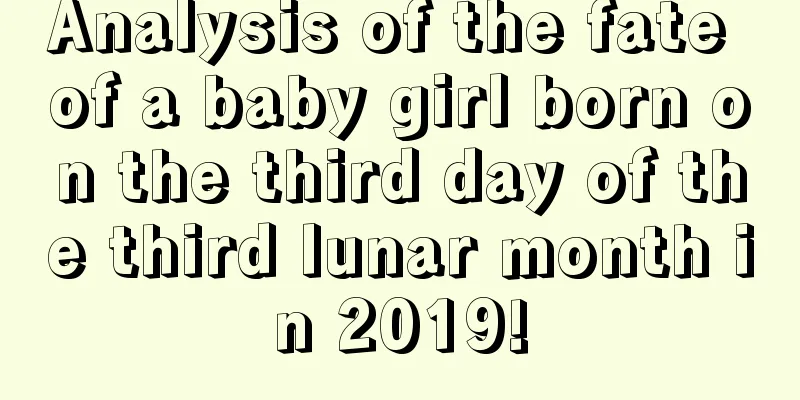Is Qixi Festival just for showing affection? In fact, it has profound cultural connotations!

Chinese Valentine's Day is a traditional folk festival in my country. You who are busy receiving flowers, giving gifts and showing affection, don't think that this is just a simple "Valentine's Day"~ Chinese Valentine's Day is not just about love. It is also the ancient Girls' Day, Women's Day, Women's Labor Day, and Literati's Day... July is also known as the Qiao Month, the Gua Month, the Orchid Autumn, the Zhao Autumn, the New Autumn, the First Autumn, the Xiang Month, the Meng Autumn, and the Early Autumn. Come to Mr. Shui Mo's website to learn more details about the seventh month of the lunar calendar in 2020.1. Worship the Seventh Sister: Begging for SkillThe story of Qixi Festival, Vega and Vega's weaving originated from the ancient Chinese worship of celestial phenomena. People gave Vega infinite imagination through astrological observation. The Seventh Sister is based on the star Vega. She is also the patron saint of lovers, women and children. July 7 is her birthday. People worship the Seventh Sister on the night of the seventh day of the seventh month to pray for blessings, make wishes, beg for skills, pray for marriage, and protect the safety of children.The day of begging for cleverness is when women compete with each other in cleverness. The women prepare various exquisite items to pay tribute to the Seventh Sister, and it is also an opportunity to publicly compete in their craftsmanship. The real competitions of ingenuity mainly take the forms of "threading a needle to beg for ingenuity", "the happy spider responding to ingenuity", "threading a needle under the moon", "competing for ingenuity in the orchid night", and "testing ingenuity by throwing a needle". Threading a needle to pray for dexterity is also called "contest of skill", in which women compete in needle threading, and the winner is determined by the speed; "threading a needle facing the moon" increases the difficulty of ordinary begging for dexterity, by threading the needle facing the moon; the spider competition is not a needle-threading competition, but catching a spider and putting it in a box, and opening the box the next morning to check the density of the spider web; the custom of throwing a needle to test skill became popular later, and was popular in the Ming and Qing dynasties. The embroidery needle is placed in a container with a water film formed to see if it can float and form a pattern on the bottom of the container to test intelligence and skill. It can be seen from this that this custom reflects the social standards for evaluating women in ancient China, where men farmed and women wove, and being dexterous and deft was the foundation of a woman's life. Women are responsible for taking care of children, doing housework, and protecting women and children. The Seventh Sisters become the objects of worship and sacrifice for women. Qiqiao is not just about being clever, it also embodies people's yearning for a happy family and a satisfying life. 2. The meeting of the Cowherd and the Weaver Girl: the yearning for a happy loveIn the mid-latitudes of the northern hemisphere, at nightfall in early autumn every year, especially around the seventh day of the seventh month of the lunar calendar, the Milky Way is exceptionally bright. From the visual effect on the earth, Vega in Lyra and Altair in Aquila, which are originally very far apart, seem to be connected by the Milky Way. The ancients loved observing the celestial phenomena, and gradually endowed this phenomenon with rich legends, which later evolved into the story of the Seven Fairies and Dong Yong. In these legends, the Cowherd and the Weaver Girl can only meet once a year, so people regard their difficult love and their undying loyalty to love as an example to yearn for and praise, and pray for happy love and a happy family on Valentine's Day. "When the golden wind and jade dew meet, it is better than countless things in the world" is Qin Guan's romantic description of the Chinese Valentine's Day in his poem "Magpie Bridge".3. Celestial worship: exploration of nature and understanding of societyThe meaning of begging for cleverness and love on the Qixi Festival both originated from the ancient people's stargazing and divination. The ancients corresponded heaven and earth by "dividing the stars" in the sky and "dividing the fields" in geographical areas. This formed the complex star system in the sky and the four directions and nine provinces on earth. In the vast star system, "Niu Su" is located on the east coast of the Milky Way. It is composed of 6 stars and looks like a cow with two horns on its head but only three legs. Therefore, the ancients called it "Qianniu". The three "Vega" stars are located in the north of Niu. Among them, "Vega I" is the fifth brightest star in the sky, second only to "Arcturus", so it is often directly called "Vega". The ancients referred to the "Niu Suxing" and "Zhe Nu" as "Cowherd and Weaver Girl".This correspondence between heaven and earth formed a celestial realm with the "Emperor Star" as its center and the "Three Enclosures, Four Symbols and Twenty-Eight Mansions" as its main body, which is a hierarchical and large-scale aerial society. The human world is a society centered on the royal capital, with the four directions and nine provinces as the world view. Looking at it today, these classifications and correspondence methods are not scientific, but they are not completely without merit. Science progresses through step-by-step observation, hypothesis and continuous verification. At the same time, the ancients corresponded heaven and earth in this way, arranged the social order of the human world through observation of the stars, and imagined the hierarchy of the heavens through understanding of human society. These were all people's ways of understanding the society they lived in. Although not scientific, this self-consistent theoretical logic became the criteria and standards for people's behavior. IV. “Seven”: Between Mystery and Philosophy"Seven" has always been a mysterious number, for example, 7 is the largest prime number and the spectrum has 7 colors. In China, seven is also often used to represent auspiciousness. "Qixi" falls on the seventh day of the lunar month or the seventh day of the lunar month. In ancient times, people listed the first day of the first lunar month, the second day of the second lunar month, the third day of the third lunar month, the fifth day of the fifth lunar month, the sixth day of the sixth lunar month, the seventh day of the seventh lunar month, and the ninth day of the ninth lunar month as auspicious days. July 7th, which falls on the same day as the double seventh, is an auspicious day for celebration.Qixi Festival is originally a festival for people to observe celestial phenomena and express their beautiful expectations for the human society, so "seven" itself is related to celestial phenomena. In ancient China, people referred to the sun (yang), the moon (yin) and the five planets of gold, wood, water, fire and earth as the Seven Luminaries. "Shang Shu Kao Ling Yao" records: "(When the heaven and earth were created), the seven stars were all in the first degree of Altair." "Yi Zhuan" records: "The sun, moon, and five planets all started from Altair." Therefore, Yin and Yang and the Five Elements just constitute the "2+5" seven stars. Coincidentally, the Semites of ancient Babylon also noticed the seven planets based on astronomical observations, but the difference from the Chinese was that they called the sun, moon and five major planets planets. They believed in the Seven Luminous Gods, and thought they took turns in ruling and dominating the vicissitudes of the world. Later, people gradually used these seven planets as the cycle of time rotation, one week is a week, and one cycle is 7 days. This week system was introduced to Northern Europe through Rome, and the Northern Europe changed the names of the seven gods into corresponding names in their own mythology system, which eventually evolved into the name of the week in English today. For example, the first day of the week is Sunday, named after the sun (Sun); the second day is Monday, named after the moon (Mon); the third day is Tuesday, named after Mars, the god of war in Roman mythology. The Norsemen replaced it with Tyr, the god of war in their own mythology system. Tues in Tuesday is a variation of Tyr. The fourth day is named after Mercury. The god corresponding to Mercury in Norse mythology is called Woden, so Wedne in Wednesday is a transformation of Woden; the fifth day is named after Jupiter. Jupiter is the god of thunder in Roman mythology. The Norse people replaced it with their own god of thunder, Thor, so Thursday in Thursday is a transformation of Thor; the sixth day is named after Venus. Venus is Venus, the goddess of love and beauty in Roman mythology. The Norse people replaced it with their god of love Frigg, so Fri in Friday is a transformation of Frigg; the seventh day is named after Saturn, which is the god of agriculture in Roman mythology. There is no such god in Norse mythology, so it is directly transliterated as Saturday. Japan still uses this name for the week today. The seven days of the week are Sun, Moon, Mars, Mercury, Jupiter, Venus and Saturn. In the Old Testament, God created the world in six days, and rested on the last day, which was Saturday. Sunday is the day when Jesus was resurrected. Christianity holds worship services on this day, so Sunday is also called Sunday. China now calls Monday, Tuesday, etc. by replacing the day with numbers. And because a day is just one day, Sunday is also called Zhoutian. The word "week" here means a cycle of the seven stars changing positions, which is a week. However, the earliest "week" in China did not have this meaning. It is also related to "seven" and the Chinese Valentine's Day. It specifically refers to the meeting of the Cowherd and the Weaver Girl on the Chinese Valentine's Day every year, which is called the week. The Tang Dynasty poet Cui Hao wrote in his poem "Two Poems on the Qixi Banquet in Xuanpu": The moon in Chang'an city is as bright as a silk thread, and every family is holding needle and thread tonight. The fairy skirt and jade pendant are in vain, as we can never meet in heaven or on earth. The night in Changxin is getting dark and gloomy, and a few fireflies are flickering in the jade steps and golden pavilion. Ban Ji was extremely worried that night, and watched the Bullfight in the Milky Way at midnight. On the night of Chinese Valentine's Day, the scene of thousands of families watching the stars under the bright night sky is described vividly and clearly. From ancient times to the present, human beings have never stopped observing and exploring natural celestial phenomena, arranging the order of human society, yearning for perfect love and pursuing a better life. Therefore, what we pray for on Chinese Valentine's Day is not only personal love, but also everything from being down-to-earth to gazing at the stars, from daily life to science and philosophy. We need to base ourselves on life, focus on traditional culture, look at the world, and slowly experience it from a festival like Chinese Valentine's Day. |
Recommend
Is it possible to propose marriage on January 30th of the lunar calendar in 2022? How about proposing marriage?
The pros and cons of proposing marriage at differe...
Can you travel far away on the Ghost Festival on July 15, 2019? How can you ward off evil spirits when going out on Ghost Festival?
Introduction: Generally, you need to choose an aus...
Is it a good time to move on April 19th of the lunar calendar in 2019?
If you want to know more about the dates in April...
Is the seventh day of the fourth lunar month in 2022 a good date? Can I sign the contract?
The fourth month of the lunar calendar has arrived...
2018 July 11th auspicious time, good and bad time query
The Fortune Teller website has carefully compiled...
Is it okay for Guyu to get engaged? How to choose the right engagement date?
There are certain considerations when choosing the...
Is it possible to move house on the 30th day of the first lunar month in 2019? Analysis of the things to pay attention to when choosing a date for moving!
Introduction: In our country’s tradition, you need...
Is a baby born on the 11th day of the sixth lunar month in 2022 a Cancer?
The baby's zodiac sign is different depending ...
Is the fate of a boy born on September 27, 2018 in the lunar calendar good or bad?
Every year is different, so the eight characters a...
What to do if you have bad luck around Qingming Festival? Query the hexagrams during Qingming Festival in 2022
After entering Qingming Festival, we also enter th...
Can I get a haircut on the seventh day of the second lunar month in 2022? How about haircut days?
The second month of the lunar calendar has arrived...
Is the 14th day of the fifth lunar month in 2020 a suitable day for grave repair? What zodiac sign is in conflict with July 4th?
Introduction: Grave repair is one of the important...
Can I get a haircut on November 14, 2018 in the lunar calendar?
Nowadays, people are not so demanding about their ...
Is it good for a girl to be born on the ninth day of the first lunar month in 2018? What is the best time for a dog girl to be born?
Everyone has his or her own life journey, so the f...
In which direction is the God of Happiness on September 24, 2020?
In which direction is the God of Happiness on Sep...









